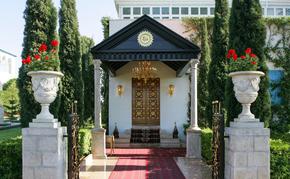The views expressed in our content reflect individual perspectives and do not represent the authoritative views of the Baha'i Faith.
The Baha’i teachings introduced a revolutionary new and yet ancient concept into the world—that all of the prophets and messengers of God can be seen as one and the same soul.
Every divine messenger brings a similar message. Every prophet teaches love. Every manifestation of God starts a renewed religion that builds on the past traditions. Every holy soul leads people to the realization of a higher and more noble spiritual purpose.
In a tablet included in the book Gems of Divine Mysteries, Baha’u’llah, the founder of the Baha’i Faith, wrote that “… all the Prophets are but one and the same soul, spirit, name, and attribute …”
In several places in his writings, Baha’u’llah went on to elaborate further:
… view all the Prophets and Messengers of God as one soul and one body, as one light and one spirit, in such wise that the first among them would be last and the last would be first. For they have all arisen to proclaim His Cause and have established the laws of divine wisdom. They are, one and all, the Manifestations of His Self, the Repositories of His might, the Treasuries of His Revelation, the Dawning-Places of His splendour and the Daysprings of His light. Through them are manifested the signs of sanctity in the realities of all things and the tokens of oneness in the essences of all beings. Through them are revealed the elements of glorification in the heavenly realities and the exponents of praise in the eternal essences. From them hath all creation proceeded and unto them shall return all that hath been mentioned. And since in their inmost Beings they are the same Luminaries and the self-same Mysteries, thou shouldst view their outward conditions in the same light, that thou mayest recognize them all as one Being, nay, find them united in their words, speech, and utterance.
For those raised in more traditional religions, this new way of looking at the prophets and founders of religion may seem hard to imagine at first. When we’re brought up to believe that Christ or Krishna or Moses or Muhammad take precedence over all other spiritual messengers, we tend to learn about only one of the great founders of Faith, and also may learn to discount or even disparage the others. Rather than intelligently and independently evaluating their teachings and messages, we’re taught to value one and discount the rest. Instead of thinking and then deciding for ourselves, we merely follow the old ancestral traditions without questioning them, which, as Abdu’l-Baha said in a talk he gave in Paris, can lead to preference and prejudice:
All religions have gradually become bound by tradition and dogma.
All consider themselves, respectively, the only guardians of the truth, and that every other religion is composed of errors. They themselves are right, all others are wrong! … If all condemn one another, where shall we search for truth? All contradicting one another, all cannot be true. If each believe his particular religion to be the only true one, he blinds his eyes to the truth in the others. …
We should, therefore, detach ourselves from the external forms and practices of religion. We must realize that these forms and practices, however beautiful, are but garments clothing the warm heart and the living limbs of Divine truth. We must abandon the prejudices of tradition if we would succeed in finding the truth at the core of all religions.
For Baha’is, detaching ourselves from the external forms and practices of religion means seeing each one of the messengers of God reflecting the same light and bringing the same essential message, as Baha’u’llah confirmed in The Book of Certitude:
… the Bearers of the trust of God are made manifest unto the peoples of the earth as the Exponents of a new Cause and the Bearers of a new Message. Inasmuch as these Birds of the Celestial Throne are all sent down from the heaven of the Will of God, and as they all arise to proclaim His irresistible Faith, they therefore are regarded as one soul and the same person. For they all drink from the one Cup of the love of God, and all partake of the fruit of the same Tree of Oneness. …
If thou wilt observe with discriminating eyes, thou wilt behold them all abiding in the same tabernacle, soaring in the same heaven, seated upon the same throne, uttering the same speech, and proclaiming the same Faith. Such is the unity of those Essences of being, those Luminaries of infinite and immeasurable splendour. Wherefore, should one of these Manifestations of Holiness proclaim saying: “I am the return of all the Prophets,” He verily speaketh the truth.
Does this mean that every messenger of God is exactly like all the others? No. Baha’u’llah also wrote in The Tabernacle of Unity that:
… in one sense the stations of the Prophets of God differ one from another. For instance, consider Moses. He brought forth a Book and established ordinances, whilst a number of the Prophets and Messengers who arose after Him were charged with the promulgation of His laws, insofar as they remained consonant with the needs of the age. The books and chronicles annexed to the Torah bear eloquent testimony to this truth.
So some prophets do differ, but in another respect they’re regarded as one soul? How does that work? Baha’u’llah explained that:
… all the Prophets have proceeded from God and have returned unto Him. Viewed in this light, they are all as one and the same Being, inasmuch as they have not uttered a word, brought a message, or revealed a cause, of their own accord. Nay, all that they have said hath proceeded from the one true God, exalted be His glory. They have all summoned men unto the Supreme Horizon and imparted the tidings of eternal life. …
Viewed from one perspective these holy Souls are one: the first among them is the same as the last, and the last is the same as the first. All have proceeded from God, unto Him have they summoned all men, and unto Him have they returned.
So the succession of divine messengers throughout history have the same essence—but not the same mission. Baha’u’llah taught that the light of one prophet shines just as bright as the light of all the others, but their missions in the age they appear do differ. In Gleanings from the Writings of Baha’u’llah, he described those differences this way:
In this respect, each Manifestation of God hath a distinct individuality, a definitely prescribed mission, a predestined revelation, and specially designated limitations. Each one of them is known by a different name, is characterized by a special attribute, fulfils a definite mission, and is entrusted with a particular Revelation. …
It is because of this difference in their station and mission that the words and utterances flowing from these Well Springs of Divine knowledge appear to diverge and differ. Otherwise, in the eyes of them that are initiated into the mysteries of Divine wisdom, all their utterances are, in reality, but the expressions of one Truth. …
Know thou assuredly that the essence of all the Prophets of God is one and the same. Their unity is absolute. God, the Creator, saith: There is no distinction whatsoever among the Bearers of My Message. They all have but one purpose; their secret is the same secret. To prefer one in honor to another, to exalt certain ones above the rest, is in no wise to be permitted. Every true Prophet hath regarded His Message as fundamentally the same as the Revelation of every other Prophet gone before Him.

















Comments
Sign in or create an account
Continue with Facebookor